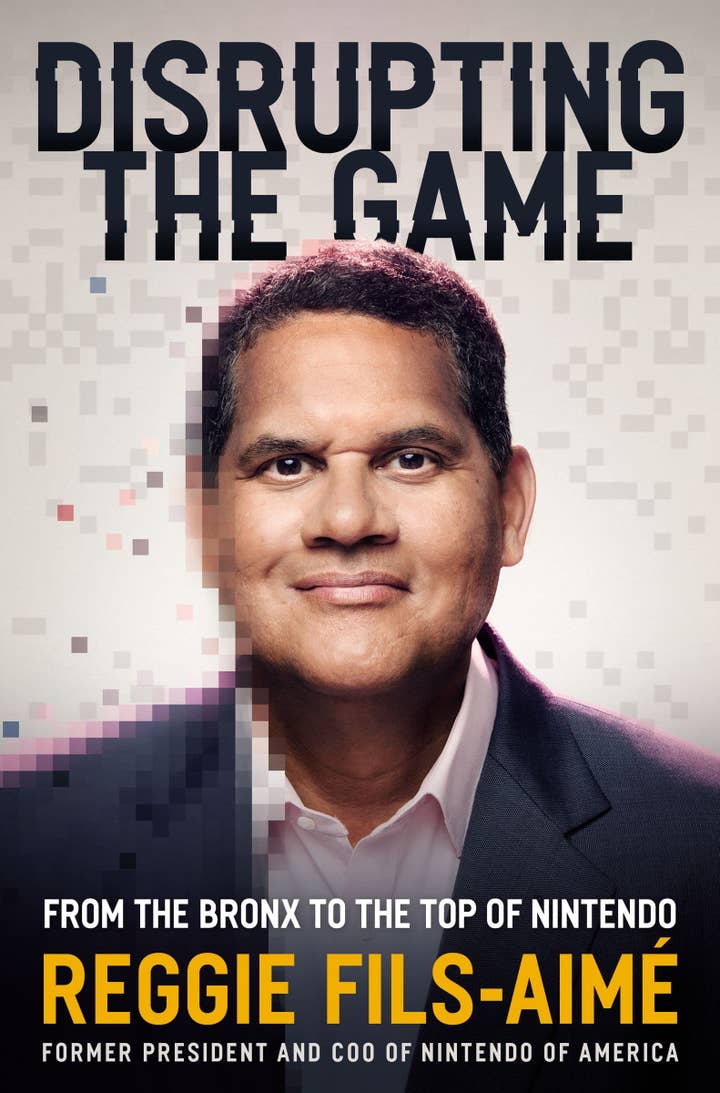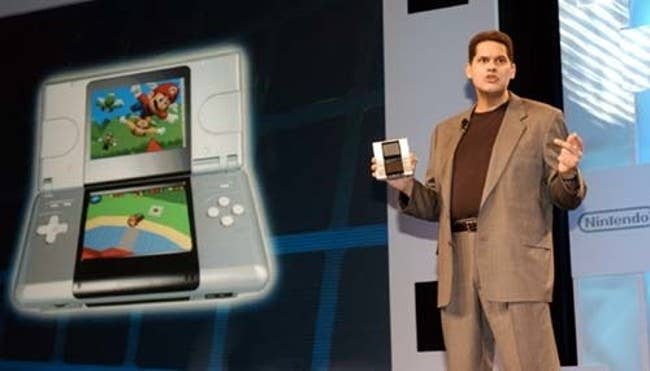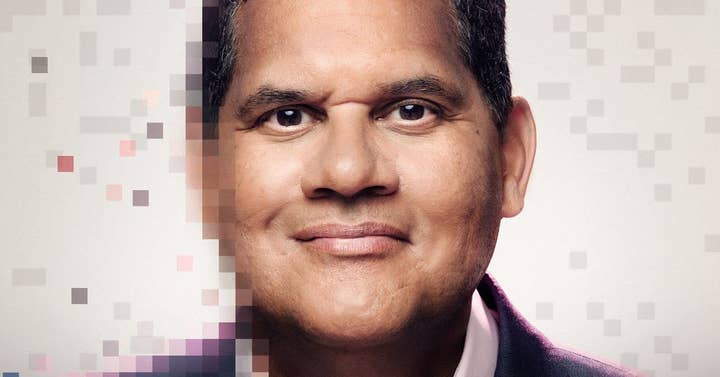Five lessons from Reggie Fils-Aime's book
Former Nintendo President's autobiography offers insight into his success and the power of self-belief
Reggie Fils-Aime is one of the most successful executives in game industry history. In his new book, Disrupting the Game, Fils-Aime recounts his life in business -- around half the book covers his time at Nintendo -- offering tips and advice to would-be leaders and entrepreneurs.
While Nintendo fans, and budding business leaders, will find value in this book, I found its most revealing moments by reading between the lines. Reggie is an interesting man (though not always in exactly the ways he imagines).
Few gaming execs have a greater claim to be taken seriously as Reggie Fils-Aime. As head of sales and marketing, and then president and CEO of Nintendo of America, he oversaw the company during an era that spanned the Nintendo DS, Wii, 3DS, Wii U, and Switch.
His ability to connect with fandom and the media via bombastic presentations at live events such as E3 made him an internet celebrity. The lower-middle class child of Haitian immigrants, he is one of the very few people of color who have held senior positions in the world of entertainment.
He has managed to closely associate himself with the oft-touted business philosophy of "disruption" and "blue ocean thinking," even though they are fairly commonplace ideas lifted from business literature.
Following his retirement from Nintendo in 2019, Fils-Aime has been knocking around as a board member at various organizations, while helping students at alma mater Cornell University as a 'Leader in Residence.'
By the book
Disrupting the Game comes across much like a commencement speech. Its overt lessons are well-worn bromides that urge readers to believe in their own abilities, work hard, and show some grit when the going gets tough.

His anecdotes about life within Nintendo offer a few amusing vignettes, but mostly focus on planning meetings in which subsequently successful company strategies were discussed and agreed, without much in the way of drama.
Reggie -- he prefers to be called by his first name, even while he refers to his bosses as 'Mr. So-and-So' -- comes across as a person for whom selling games and game consoles is the pinnacle of human endeavor. Reggie does not do self-deprecation or humility. This is a two-hour read that celebrates his achievements of which, to be sure, there are many.
He also picks out various colleagues down the years who have inspired him -- most notably the late Satoru Iwata, former chairman of Nintendo, who Reggie views with unfailing respect and admiration, even on the rare occasions when they disagree with one another.
Iwata clearly knew his man when he hired Reggie to run Nintendo of America. Fils-Aime proved to be a capable and imaginative leader who made great decisions. He demonstrated a skill at forging alliances, and knew when to pick a fight, and when to back down.
If you're someone who aspires to Reggie's level of success, you'll do worse than take note of the way he moved into one of the toughest jobs in the business, and made it all his own.
But, as I say, there's as much to learn reading between the lines, as there are from Reggie's overt lessons. These are the five lessons I learned from Disrupting the Game:
1. Self-belief as a self-fulfilling strategy
If Reggie has ever lain awake at night worrying that he's not smart enough for the job at hand, or that he's making a bad call, there is no sign of it in this book. His entire personality type is positivity and self-belief. He advocates for addressing a problem by visualizing its successful resolution, believing in himself, and then moving toward that vision. That's it.
Reggie's commitment to his work, his intellectual capacities, and his undoubted abilities as a problem-solver, have provided him with the confidence that he'll make the right call.
If you're someone who aspires to Reggie's level of success, you'll do worse than take note of the way he moved into one of the toughest jobs in the business, and made it all his own
Disrupting the Game is essentially a series of anecdotes about how Reggie came across a tough problem, figured out how to solve it, and then strived to overcome various obstacles to get his way; invariably with happy results.
I don't know anyone else who either has this level of self-confidence, or who celebrates it without the slightest reserve or caveat.
When Reggie admits to making a misstep, it's that he failed to persuade other people that he's right, leading to a situation in which he does not get his own way, resulting in unhappiness and disappointment for everyone.
Reggie is someone who does not trouble to doubt himself. It seems to have served him well.
2. The value of a brass neck
When, in 2003, Nintendo needed a new vice president of sales and marketing, the headhunters contacted Fils-Aime, who was working at cable TV channel VH1 at the time. Reggie went through a series of interviews, including one facing tough old Nintendo of America stalwarts Peter Main and Howard Lincoln.
Reggie was a gaming fan who had played a lot of Nintendo in his younger days. But in the GameCube era, he saw the company as a declining force, and worried that it would be a dead end for him. So, he requested an interview with newly minted global president Satoru Iwata.
This was unprecedented. (Ask yourself how many times you've interviewed for a job, and then requested a meeting higher up the chain, let alone the global president). Reggie's request caused a stir within the corridors of Nintendo, of the "Who does he think he is?" variety.
"In retrospect, and with now my full understanding of the Nintendo culture, I can see how my request would be perceived as unconventional," notes Reggie, in a rare moment of self-admonishment. "Maybe even arrogant." (Perish the thought!)
In the event, the meeting went so well it overran, with Satoru Iwata ending up inviting Reggie over to Kyoto to hang out. Reggie's brass neck won the day.

3. Live the job to the maximum
Sadly, Satoru Iwata is no longer with us. But I like to imagine his first impressions of the self-possessed Fils-Aime. Iwata was a man of keen perception while I think Fils-Aime's strengths are more in the practical, execution department.
Anyway, I've always felt that Nintendo's core strength is its arrogance. This is a company that often screws up, but when it wins, it wins big. Disruption is nothing new to Nintendo. It's been zagging while others zig for decades. Nintendo's entire culture is built around the notion of its own superiority, cloaked in a thin mantle of respectable politeness.
I suspect Iwata saw in Reggie the personification of Nintendo
I suspect Iwata saw in Reggie the personification of Nintendo. Reggie had scored some major hits in his career, but he'd also faltered a few times, moving to companies that weren't a great fit for him. He was ready to prove something about himself; something that Nintendo too was hungry to demonstrate -- absolute superiority over rivals.
Reading Disrupting the Game, I'm struck by how much of himself Reggie gives to his work. Personal anecdotes are used only insofar as they pertain to his own performance and skill set. Nothing ever gets between him and his work. If he ever took interesting vacations or enjoyed fun hobbies outside his work, he doesn't mention them.
I have no doubt that whatever Reggie turns his attention to, that thing gets 100%. Satoru Iwata saw this too. Few of us are really and truly willing to give so much of ourselves to our jobs. Those who aspire to Reggie-like success should probably be forewarned of the necessary level of commitment.
4. Selling common sense as disruptive genius
A story from Reggie's time as an exec at Panda Express made me laugh out loud, though it wasn't written for comedic effect. It demonstrates Reggie's habit of opting for a smart, perfectly sensible business plan, which he then frames as some kind of genius disruption of the staid status quo.
I'll get to Panda Express in a minute. But one example of this is a meeting at Nintendo in Kyoto when the bosses are discussing how they should focus their marketing on the Nintendo DS.
You'll recall that the DS had a touchscreen, which at the time was a big deal. Anyway, Reggie declares (to an apparently stunned audience) that the marketing effort should focus on ... the touch screen. After a while, Satoru Iwata concedes that "Reggie is right!"

Anyway, Panda Express.
During his time at various fast-food companies, Reggie makes some genuinely smart decisions, using a mixture of data and the anecdotes of restaurant managers to create new product lines and marketing strategies.
One of those is chicken with black bean sauce and asparagus. Reggie brings this in to compete with the company's own Orange Chicken which is very popular, but more costly to make. It's a huge hit.
One day, the head of procurement comes to see Reggie with terrible news. There's been a blight in the asparagus crop this year. The price is likely to double, eating into the margins for chicken with black bean sauce and asparagus. What's to be done?
Now, I'm no restaurant magnate, nor even much of a cook. But my initial reaction is probably the same as yours. Switch out the asparagus for something abundant, tasty and cheap like, say, broccoli. That's the common sense thing to do, right?
Here's Reggie, over the course of a page or two: "This was a huge problem ... we convened a team to work through the options ... we needed to be thoughtful ...we pivoted to chicken-and-broccoli with black bean sauce ... it was a classic example of stepping back to understand the breadth of the problem."
He concludes that "solving difficult business problems often has cascading benefits beyond the immediate solution," noting how he and the procurement guy subsequently became best buddies.
5. Relentless self-branding (if you can get away with it)
It's worth remembering that Reggie is a pitchman. He's all about sales and marketing, and in this book he's selling and marketing himself, as a revolutionary thinker in the business realm.
There's as much to learn reading between the lines, as there are from Reggie's overt lessons
Some of his longer sections in the book dwell on his appearances at E3, and the deep thought that went into now famous lines like "I'm here to kick ass and take names." He revels in his nickname 'the Regginator" and the times when fans ask for selfies including, at one point, Satoru Iwata's daughter in her father's hospital room.
The word "Reggie" appears with uncommon frequency in this book. Almost all quotes from other people begin with them using his name, as in "Reggie. I think we need to talk about your crazy, revolutionary idea some more, before I finally agree with its genius and we all break yet another set of business records."
My review copy of Disrupting the Game doesn't have a search function so I can't dig into the numbers, but the word "Reggie" has got to be there at least a hundred times. I doubt there are many other autobiographies that make such liberal use of the author's own first name.
Writing this piece, I've been a bit spiky about Fils-Aime. There's no way of reading this book without marveling at the man's boundless belief in himself. For better or worse, I think a lot of readers and critics are going to pick up on his bombast. It may lead to yet another round of Reggie memes. (Now wouldn't he just love that outcome?)
I don't believe he's constantly self-promoting and self-celebrating because he feels the need to big himself up, or because he's desperate for ever more recognition. He's doing it because promotion, marketing, and selling is core to his very being. He writes often of his "authenticity" and I take him at his word. This is who he is, and really, revelation is the function of biography.
If he wasn't promoting himself, he'd be promoting pizzas, or TV interstills or joypad bundles. All things being equal, I think this relentless bravado is what I like about him most.
Disrupting the Game by Reggie Fils-Aime is published by HarperCollins Leadership, and is out on May 12.
